Introduction
ConvertKit vs ClickFunnels: Explore our in-depth comparison to discover which tool best suits your business needs in terms of email marketing precision and sales funnel optimization. When it comes to enhancing your marketing strategy, selecting the right tools can significantly impact your success. In this comprehensive comparison, we’ll examine the key features and functionalities of ConvertKit vs ClickFunnels. Whether you’re prioritizing email marketing effectiveness or optimizing your sales funnels, understanding the strengths of each platform is crucial. Join us as we dissect these tools to help you make an informed decision that aligns with your business goals and marketing objectives.
Table of Contents
Features and Functionality: ConvertKit vs ClickFunnels
When choosing between ConvertKit and ClickFunnels, understanding their features and functionality is crucial. Both tools offer powerful capabilities, but they cater to different needs. This section will provide a detailed comparison to help you determine which platform suits your business best.
ConvertKit Features and Functionality
ConvertKit is primarily an email marketing tool designed with creators in mind. Its features include:
- Email Marketing: ConvertKit offers robust email marketing tools, including customizable email templates, email broadcasts, and personalized content based on subscriber behavior.
- Automation: With ConvertKit’s visual automation builder, you can create complex workflows that guide subscribers through personalized journeys. This includes automated sequences and triggers based on actions taken by the subscriber.
- Tagging and Segmentation: ConvertKit allows you to tag and segment your audience effectively. This feature ensures that your emails reach the right people based on their interests and behaviors.
- Landing Pages and Forms: ConvertKit provides templates for creating landing pages and opt-in forms to grow your email list.
- Integrations: ConvertKit integrates with numerous tools like Shopify, WordPress, and Zapier, making it easy to connect with other platforms you use.
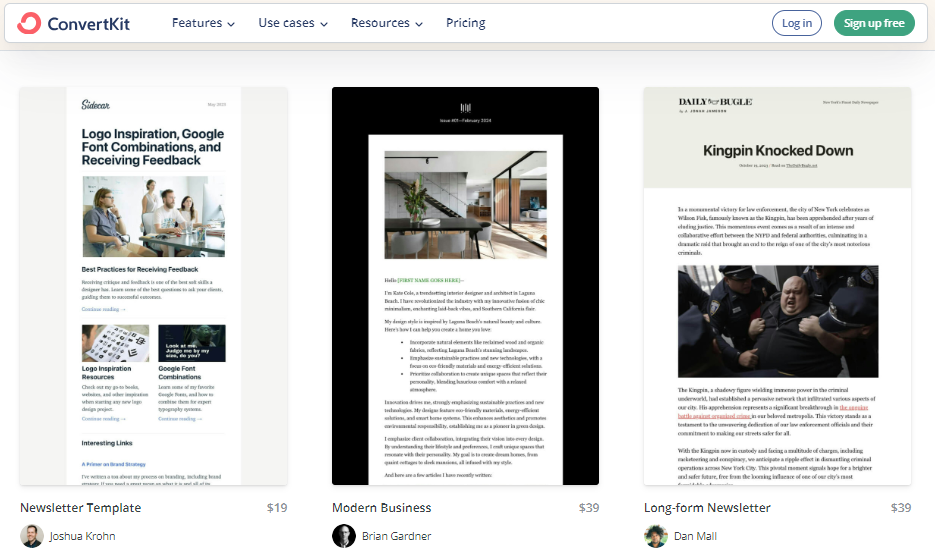
ClickFunnels Features and Functionality
ClickFunnels is a comprehensive sales funnel builder designed to help you create and optimize funnels that convert visitors into customers. Its features include:
- Funnel Building: ClickFunnels allows you to build sales funnels with its drag-and-drop editor. This includes everything from landing pages to checkout pages.
- Landing Pages: ClickFunnels provides a wide range of customizable templates for creating effective landing pages.
- Email Marketing: ClickFunnels includes an email marketing tool called Actionetics, which allows you to create and automate email sequences.
- A/B Testing: With ClickFunnels, you can run A/B tests to optimize your funnels and improve conversion rates.
- Integrations: ClickFunnels integrates with various third-party tools, including payment gateways like Stripe and PayPal, CRM systems, and email marketing services.

Ease of Use: ConvertKit vs ClickFunnels
When deciding between ConvertKit and ClickFunnels, ease of use is a critical factor to consider. Both platforms are designed to simplify complex marketing tasks, but their user interfaces and overall user experiences differ significantly. This section will compare the ease of use for both ConvertKit and ClickFunnels to help you determine which platform is more intuitive and beginner-friendly.
ConvertKit Ease of Use
ConvertKit is known for its user-friendly interface and straightforward approach to email marketing. Here are some key aspects that contribute to its ease of use:
- Clean and Intuitive Dashboard: ConvertKit’s dashboard is clean and well-organized, making it easy for users to navigate and find the tools they need. The simplicity of the interface reduces the learning curve, especially for beginners.
- Visual Automation Builder: The visual automation builder in ConvertKit allows users to create complex email sequences with a drag-and-drop interface. This feature simplifies the process of setting up automation workflows, making it accessible even for those without technical skills.
- Easy List Management: ConvertKit’s tagging and segmentation features are straightforward, allowing users to manage their email lists efficiently. The platform makes it easy to create and organize tags, ensuring that emails are sent to the right audience.
- Helpful Resources: ConvertKit offers a range of tutorials, webinars, and guides to help users get started and make the most of the platform. Their customer support is also highly rated, providing additional assistance when needed.

ClickFunnels Ease of Use
ClickFunnels, while powerful, has a more complex interface due to its extensive features. However, it is designed to guide users through the process of building effective sales funnels. Here are some aspects of its ease of use:
- Drag-and-Drop Editor: ClickFunnels’ drag-and-drop editor allows users to create and customize pages within their funnels without needing to write any code. This feature is intuitive but may require some time to master due to the numerous customization options available.
- Step-by-Step Funnel Building: ClickFunnels provides a step-by-step approach to building funnels, guiding users through each stage of the process. This feature helps simplify funnel creation for beginners.
- Comprehensive Templates: ClickFunnels offers a wide range of pre-built templates for various types of funnels. These templates provide a solid starting point, reducing the time and effort needed to create a funnel from scratch.
- Learning Curve: Due to the extensive range of features and customization options, ClickFunnels has a steeper learning curve compared to ConvertKit. However, the platform offers numerous tutorials, training videos, and a supportive community to help users get up to speed.

Which Platform is More Intuitive and Beginner-Friendly?
- ConvertKit: ConvertKit is generally more intuitive and easier to use, especially for beginners focused on email marketing. Its clean interface and visual automation builder make it accessible and straightforward.
- ClickFunnels: ClickFunnels offers powerful features for building sales funnels but requires more time to learn and master. While it provides excellent guidance through the funnel-building process, the extensive customization options can be overwhelming for new users.
Pricing: ConvertKit vs ClickFunnels
When choosing between ConvertKit and ClickFunnels, pricing is a crucial factor to consider. Both platforms offer different pricing structures based on the features and services they provide. This section will compare the pricing plans of ConvertKit and ClickFunnels to help you determine which platform offers the best value for your money.
ConvertKit Pricing
ConvertKit’s pricing is based primarily on the number of subscribers you have. Here are the main pricing tiers:
- Free Plan: ConvertKit offers a free plan for up to 10,000 subscribers. This plan includes unlimited landing pages, sign-up forms, email broadcasts, and the ability to sell digital products and subscriptions.
- Creator Plan: Starting at $25 per month for up to 1000 subscribers, this plan includes all features from the free plan plus automated funnels and sequences, integrations with third-party tools, and premium support.
- Creator Pro Plan: Starting at $50 per month for up to 1000 subscribers, this plan includes everything in the Creator Plan plus advanced reporting, subscriber scoring, Facebook custom audiences, and a newsletter referral system. As with the Creator Plan, the price increases with the number of subscribers.
ConvertKit’s pricing structure is straightforward and scalable, making it easy for businesses to grow their email marketing efforts without unexpected costs.

ClickFunnels Pricing
ClickFunnels offers a tiered pricing model based on the features and capabilities you need. Here are the primary plans:
Startup Plan: Priced at $81 per month, this plan includes access to the funnel builder, 20 funnels, 100 pages, and up to 20,000 visitors per month. It also includes three payment gateways, three custom domains, and basic support.
Pro Plan: Priced at $248 per month, this plan includes everything in the Startup Plan plus unlimited funnels, pages, and visitors. It also offers nine payment gateways, nine custom domains, and priority support.
ClickFunnels’ pricing is higher than ConvertKit’s, but it includes comprehensive features for building and managing sales funnels, making it a robust tool for businesses focused on sales and conversions.
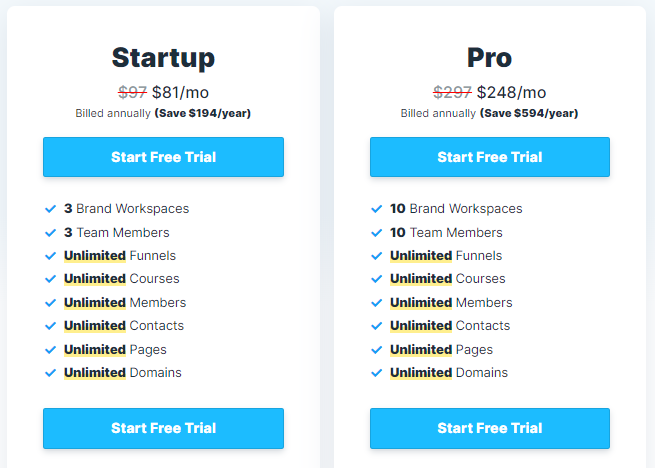
Value for Money: Which Platform Offers Better Pricing for Features?
When comparing the pricing of ConvertKit vs ClickFunnels, it’s essential to consider the value each platform provides relative to its cost:
- ConvertKit: Ideal for businesses primarily focused on email marketing. Its pricing is competitive, especially for smaller businesses and creators who need robust email marketing tools without breaking the bank. The free plan is an excellent starting point for those with a small subscriber base.
- ClickFunnels: Best suited for businesses that require a comprehensive solution for building and managing sales funnels. While more expensive, ClickFunnels offers extensive features that justify the cost for businesses looking to optimize their sales processes and drive conversions.
Integration and Compatibility: ConvertKit vs ClickFunnels
When selecting a marketing platform, it’s essential to consider how well it integrates with other tools and systems you use. In this section, we will compare the integration and compatibility of ConvertKit and ClickFunnels to help you understand which platform offers better connectivity and ease of use within your existing tech stack.
ConvertKit Integration and Compatibility
ConvertKit is designed with simplicity and usability in mind, making it easy to integrate with various tools. Here are some key points about ConvertKit’s integration capabilities:
- Email Marketing and CRM Integrations: ConvertKit integrates seamlessly with popular email marketing tools and CRMs such as Mailchimp, HubSpot, and Salesforce. These integrations ensure that you can manage your email lists and customer data efficiently.
- E-commerce Platforms: ConvertKit supports integration with major e-commerce platforms like Shopify, WooCommerce, and BigCommerce. This allows you to automate email marketing based on customer purchases and behavior.
- Content Management Systems: ConvertKit can be easily integrated with CMS platforms such as WordPress, Squarespace, and Wix. This is particularly useful for bloggers and content creators who want to capture leads directly from their websites.
- Third-Party Services: ConvertKit also integrates with a wide range of third-party services including Zapier, which extends its compatibility to hundreds of other apps and tools. This flexibility allows you to create custom workflows tailored to your business needs.
ConvertKit’s integrations are designed to streamline your email marketing efforts, making it a versatile choice for various business types.
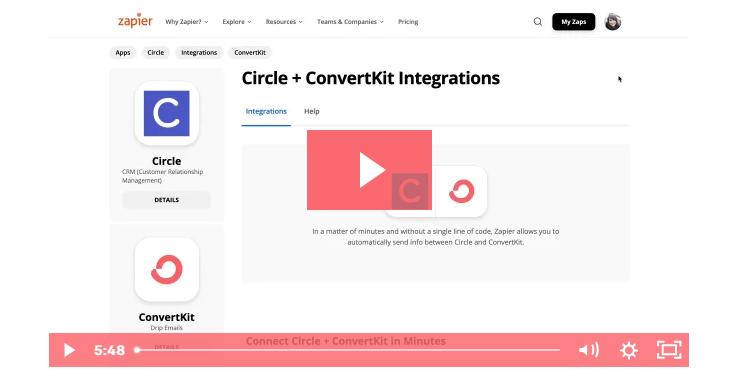
ClickFunnels Integration and Compatibility
ClickFunnels is built to be an all-in-one solution for sales funnels and online marketing. Here are some highlights of ClickFunnels’ integration and compatibility features:
- Payment Gateways: ClickFunnels integrates with multiple payment gateways including PayPal, Stripe, and Authorize.net. This makes it easy to manage transactions and sales within your funnels.
- Email Marketing Services: ClickFunnels supports integration with popular email marketing services such as Mailchimp, ActiveCampaign, and GetResponse. This allows you to handle email campaigns directly from your funnels.
- Webinar Platforms: ClickFunnels integrates with webinar platforms like Zoom and WebinarJam, enabling you to incorporate webinars into your marketing strategies seamlessly.
- CRM and Affiliate Management: ClickFunnels connects with CRM systems like Salesforce and HubSpot, as well as affiliate management tools like Backpack. This helps you manage customer relationships and affiliate marketing programs efficiently.
- Automation Tools: With integration capabilities through Zapier, ClickFunnels can connect to a wide array of third-party applications, automating various aspects of your marketing and sales processes.
ClickFunnels offers extensive integration options, making it a robust choice for businesses looking to create and manage comprehensive sales funnels.

Customer Support and Resources: ConvertKit vs ClickFunnels
Customer support and access to resources are crucial considerations when choosing a marketing platform. In this section, we will compare the customer support options and available resources for ConvertKit and ClickFunnels to help you determine which platform offers better support for your business needs.
ConvertKit Customer Support and Resources
ConvertKit prioritizes customer support to ensure users have a smooth experience with their email marketing platform. Here’s an overview of ConvertKit’s customer support and available resources:
- Support Channels: ConvertKit provides customer support primarily through email. Users can reach out to their support team for assistance with technical issues, account management, and general inquiries.
- Knowledge Base: ConvertKit offers a comprehensive knowledge base that includes articles, tutorials, and guides to help users navigate the platform’s features and functionalities independently.
- Community Forums: ConvertKit fosters a community atmosphere through forums where users can interact, share tips, and discuss best practices for email marketing strategies using ConvertKit.
- Webinars and Workshops: Periodic webinars and workshops are hosted by ConvertKit to educate users on advanced features, email marketing tactics, and platform updates.
ConvertKit’s customer support is geared towards providing personalized assistance and educational resources to help users optimize their email marketing campaigns effectively.

ClickFunnels Customer Support and Resources
ClickFunnels offers robust support options to help users maximize their sales funnel capabilities and resolve issues promptly. Here’s what you can expect from ClickFunnels’ customer support and resources:
- Support Channels: ClickFunnels provides customer support through email and live chat. Users can submit tickets for technical support, billing inquiries, and other assistance-related needs.
- Training and Documentation: ClickFunnels offers extensive training materials, including video tutorials, documentation, and step-by-step guides to help users navigate and optimize their sales funnels.
- Facebook Community: ClickFunnels maintains an active Facebook community where users can connect, ask questions, and share insights on using ClickFunnels effectively.
- Weekly Q&A Webinars: ClickFunnels hosts weekly live Q&A webinars where users can interact directly with support staff, ask questions, and get real-time assistance.
ClickFunnels’ customer support strategy focuses on providing comprehensive resources and community engagement to empower users in building successful sales funnels.

Pros and Cons: ConvertKit vs ClickFunnels
Choosing the right marketing platform involves weighing the pros and cons to ensure it aligns with your business goals and requirements. In this section, we will explore the strengths and weaknesses of ConvertKit and ClickFunnels to help you make an informed decision.
Pros of ConvertKit
ConvertKit offers several advantages that cater specifically to email marketing and automation needs:
- Simplicity and User-Friendly Interface: ConvertKit is praised for its intuitive interface, making it easy for users to create and manage email campaigns without technical expertise.
- Tagging and Segmentation: Robust tagging and segmentation features allow users to target specific audience segments effectively, enhancing personalization and engagement.
- Visual Automation Builder: The visual automation builder simplifies the creation of complex email sequences, automating workflows based on subscriber actions.
- Dedicated Support for Creators: ConvertKit focuses on serving creators, such as bloggers and online educators, with tools tailored to their content marketing needs.
ConvertKit’s strengths lie in its simplicity, effective email marketing tools, and support for content creators looking to build engaged audiences.
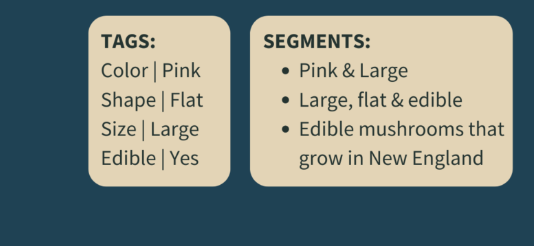
Cons of ConvertKit
Despite its strengths, ConvertKit has some limitations to consider:
- Limited Funnel Building Capabilities: Compared to comprehensive funnel builders like ClickFunnels, ConvertKit’s focus on email marketing may lack robust funnel creation features.
- Price Scaling with Subscribers: ConvertKit’s pricing can become more expensive as your subscriber list grows, potentially affecting cost efficiency for larger businesses.
- Advanced Reporting and Analytics: While sufficient for basic analytics, ConvertKit may not offer as detailed insights compared to other marketing platforms.
Understanding these limitations helps in evaluating whether ConvertKit’s features align with your business’s growth and marketing strategies.
Pros of ClickFunnels
ClickFunnels excels in creating and optimizing sales funnels, providing extensive tools for funnel building and optimization:
- Comprehensive Funnel Building: ClickFunnels offers a complete suite of tools to create and manage sales funnels, including landing pages, upsells, downsells, and order forms.
- Automation within Funnels: Automated email sequences, upsells, and downsells streamline the sales process, enhancing conversion rates and customer retention.
- Integration Capabilities: Seamless integration with third-party tools and CRMs enhances functionality, allowing businesses to synchronize data and streamline operations.
ClickFunnels’ strengths lie in its robust funnel creation capabilities and comprehensive automation features designed to optimize the sales process.

Cons of ClickFunnels
Despite its powerful features, ClickFunnels has certain drawbacks to consider:
- Learning Curve: The complexity of setting up and optimizing sales funnels may require a learning curve, especially for beginners without prior funnel building experience.
- Higher Price Point: ClickFunnels’ pricing tiers may be cost-prohibitive for smaller businesses or startups, especially when compared to more focused platforms like ConvertKit.
- Focused on Sales Funnels: While ideal for sales-oriented businesses, ClickFunnels’ emphasis on funnel building may not cater as comprehensively to other marketing aspects like content creation and email marketing.
These considerations help in assessing whether ClickFunnels’ extensive funnel capabilities align with your business’s marketing and sales objectives.
User Reviews and Testimonials: ConvertKit vs ClickFunnels
User reviews and testimonials provide valuable insights into the real-world experiences of businesses and marketers using ConvertKit and ClickFunnels. In this section, we will examine what users have to say about these platforms to help you gauge their reliability and suitability for your marketing needs.
ConvertKit User Reviews and Testimonials
ConvertKit garners positive feedback for its user-friendly interface and focused approach to email marketing automation:
- Ease of Use: Many users appreciate ConvertKit’s intuitive interface, which simplifies the process of creating and managing email campaigns.
- Effective Email Automation: Users highlight ConvertKit’s robust automation features, such as visual workflow builders and tag-based segmentation, for streamlining email marketing efforts.
- Support for Creators: Bloggers, online educators, and creators commend ConvertKit for its tailored tools that cater to their specific content marketing needs.
- Customer Support: Positive reviews often mention ConvertKit’s responsive customer support team, which assists users with technical issues and account management effectively.

ClickFunnels User Reviews and Testimonials
ClickFunnels receives acclaim for its powerful funnel building capabilities and comprehensive sales optimization tools:
- Feature-Rich Funnel Builder: Users praise ClickFunnels for its all-in-one funnel building platform, which includes drag-and-drop page editors, upsells, downsells, and order forms.
- Automation and Integration: Positive reviews often highlight ClickFunnels’ automation features within sales funnels, which automate email sequences and streamline customer journeys.
- Support for Sales Teams: Businesses focused on sales appreciate ClickFunnels’ integration capabilities with CRMs and third-party tools, enhancing workflow efficiency.
- Community and Resources: ClickFunnels users benefit from an active community and extensive training resources, including webinars and tutorials, to maximize platform utilization.
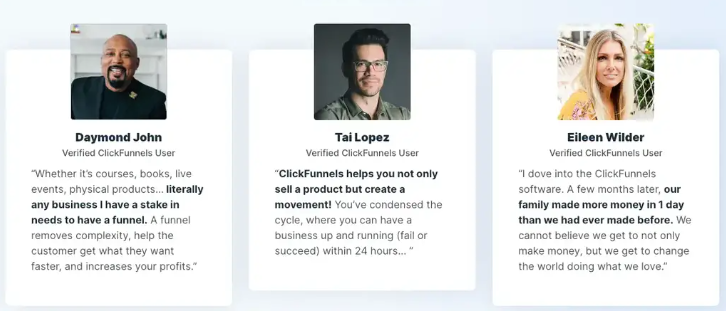
Comparative Analysis
When comparing ConvertKit vs ClickFunnels based on user reviews and testimonials, consider the following:
- ConvertKit: Ideal for creators and content marketers seeking simplicity and effective email automation, backed by responsive customer support.
- ClickFunnels: Suited for businesses focused on sales funnel optimization, offering comprehensive tools, automation features, and a supportive community.
Conclusion:
Choosing between ConvertKit and ClickFunnels hinges on understanding their unique strengths and how they align with your business goals. Throughout this comparison, we’ve delved into their features, ease of use, pricing, integration capabilities, automation, customer support, and user feedback to help you make an informed decision.
ConvertKit shines with its straightforward approach to email marketing and automation. It’s particularly beneficial for creators and content marketers looking to build and engage their audience through personalized email campaigns. The platform’s intuitive interface and robust automation tools make it a standout choice for those focused on content-driven growth strategies.
On the other hand, ClickFunnels excels in creating optimized sales funnels and maximizing conversion rates. Its comprehensive suite of tools allows businesses to build, optimize, and automate sales processes effectively. ClickFunnels is ideal for sales-oriented businesses that prioritize funnel building and customer journey optimization.
Final Thoughts
In conclusion, the best choice between ConvertKit and ClickFunnels depends on your specific business needs and marketing objectives:
- Choose ConvertKit if you are a creator or content marketer seeking simplicity, effective email automation, and tools tailored to audience engagement.
- Opt for ClickFunnels if your focus is on creating and optimizing sales funnels, maximizing conversions, and integrating robust automation into your sales processes.





